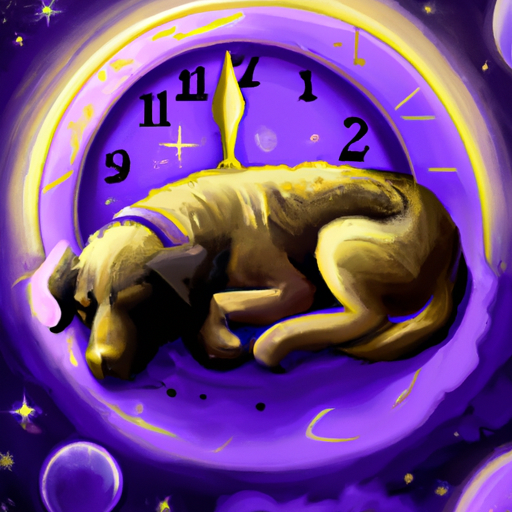Caring for a pet dog is a fulfilling but challenging responsibility. As a caregiver, understanding the sleep patterns of your furry friend can be puzzling. To help you navigate this, let’s delve into when dogs sleep through the night, what affects their sleep, and how you can ensure they get the rest they need.
Why Understanding Your Dog’s Sleep Pattern Matters
Just like humans, dogs need adequate sleep for their overall health and wellbeing. Lack of proper sleep can make your dog irritable, less responsive, and even lead to health issues. Understanding your dog’s sleep pattern can help you provide a better environment for them, ensuring they’re well-rested and happy.
When Dogs Start Sleeping Through the Night
Typically, puppies start sleeping through the night when they’re about four months old. However, this can vary based on factors such as their breed, daily activities, and overall health. Adult dogs usually sleep for 12-14 hours a day, often spread throughout the day and night. Let’s break this down:
- Puppies: They sleep for about 18-20 hours a day, mostly broken into short naps.
- Adult Dogs: They need about 12-14 hours of sleep every day.
- Senior Dogs: They require more sleep, usually around 14-18 hours.
Factors That Affect Your Dog’s Sleep
Your dog’s sleep pattern can be influenced by several factors:
- Breed: Larger breeds tend to sleep more than smaller ones.
- Health: Any underlying health issues can affect your dog’s sleep.
- Activity: Active dogs may need more sleep to recover their energy.
- Age: Older dogs often require more sleep than younger ones.
Ensuring Your Dog Gets a Good Night’s Rest
To help your dog sleep through the night, consider the following:
- Create a Comfortable Environment: Ensure their sleeping area is quiet, dark, and comfortable.
- Maintain a Routine: This includes feeding, exercise, and bedtime.
- Provide Plenty of Exercise: Physical activity during the day can help your dog sleep better at night.
- Avoid Late Night Feeding: This can prevent them from needing to go to the bathroom in the middle of the night.
Frequently Asked Questions
Q: What if my dog doesn’t sleep through the night?
A: If your dog is having trouble sleeping, it’s best to consult a vet. They can help identify any potential health issues or suggest changes to their routine.
Q: Does my dog need a specific bed to sleep on?
A: While not necessary, a comfortable bed can help your dog get a better night’s sleep.
Q: How can I tell if my dog isn’t getting enough sleep?
A: Signs of sleep deprivation in dogs include increased irritability, lack of responsiveness, and overall changes in behavior.
Remember, every dog is unique. Their sleep patterns can vary greatly, and what works for one may not work for another. As a dedicated caregiver, your understanding and patience can help your dog achieve a healthy sleep pattern.



